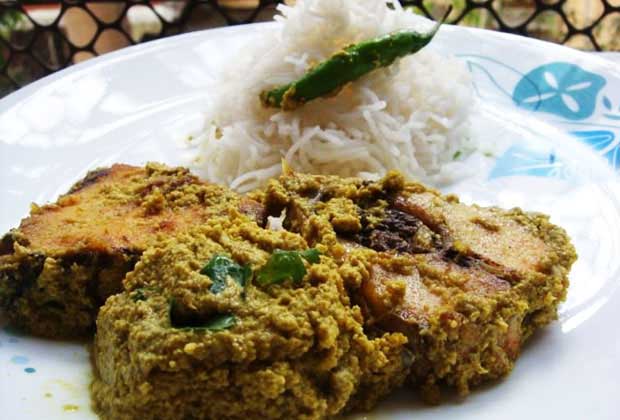It’s The Time For Hilsa
- By Kalyan KarmakarLoading...
- | 6 Aug 2015 11:52 AM IST
 X
X
 Monsoon is the best time to enjoy Ilish. Photo: Kalyan Karmakar
Monsoon is the best time to enjoy Ilish. Photo: Kalyan Karmakar
Monsoon is when fish lovers in Mumbai look glum. The local Koli fisherfolk don’t go out fishing as this is the breeding season. The Kolis like to leave the fish undisturbed during this time to help conserve the environment. The seas are choppy too.
The supply of fish in markets dry up and local restaurants are hard pressed to find seafood. Most small Malvani joints see a drop in footfalls too.
However, things are changing now with fish coming in from other parts of the country. Plus, there are the deep sea trawlers, who bring in fish as Dr Kurush Dalal says. He runs Katy’s Kitchen, a Parsi catering kitchen, and will have to source pomfrets to make Patrani Machhi for the Parsi New Year later this month. He doesn’t seem too worried about this.
The mood in Bengal is different though. My mother reminded me that this is Ilish or Hilsa season back home. A time to celebrate you see!
Hilsa is the most-prized fish for us. At one time, it was considered to be more of a Bangal (those born in East Bengal or Bangladesh before the Partition) thing, but now its appeal cuts across both Bangals and Ghotis (people originally from West Bengal).
There are huge debates whether the Ilish from Gonga (Ganges in India) or Podda (the river Padma in Bangladesh) is more superior. I remember going to Dhaka in the late 90s for work. I looked for Ilish in restaurants since I had heard so much about Bangladeshi Ilish. I was told that there wasn’t any around as all was sent to India. I finally managed to get a plate in the small hotel I was staying in, and almost passed out when I saw that it was cooked with onions. Ilish is a delicately flavoured fish and I had never come across people cooking it in onions in Kolkata.
Ilish is a bony fish and pretty expensive too, so I rarely offer it to my non-Bengali friends. They would find eating it too laborious if not scary. I too find the bony gaada (back portion) too much to handle and prefer the fatty peti (belly), which has fewer and smaller bones.
Some of the Bengali restaurants in Mumbai such as Oh Calcutta host Ilish festivals during the rain, and apparently fly the fish all over from Kolkata. You do get Ilish throughout the year in Bengali restaurants in Mumbai these days. Although the fish during the monsoons is considered to be fresher.
I’ve occasionally come across Ilish in the Khar fish market. Some are from Kolkata and the rest from Gujarat. Folks who are picky about their Ilish, like my mom, don’t think much about the Gujarati Ilish.
I am just happy and thankful for whatever I get in Mumbai!
Inspired by something I had eaten at an Oh Calcutta Ilish festival, I once made a Doi Posto Shorshe (curd, poppy seeds, mustard) Ilish at home. Since then, it has been one of my favourite Ilish preparations.
Recipe for Doi Posto Shorshe Ilish
Ingredients
6 pieces of Ilish (Hilsa)
50 to 75 g each of posto (khus khus/ poppy seeds) & whole mustard seeds
2 tbsp curd
1 tsp each of turmeric & salt, coriander & cumin powder
Few coriander leaves
Method
Part 1: Prep
1. Smear six pieces of Hilsa with a touch of turmeric and salt.
2. Shallow fry and set aside.
3. Make a paste of 50 to 75 g of posto, ditto for whole mustard seeds, two tablespoons of curd, one teaspoon each of turmeric and salt, half a teaspoon each of sugar, coriander and cumin powder and a few coriander leaves. Use a food processor or a 'Mixie' as it is called in most Bengali homes.
4. Add the marinade to the fried fish in a microwave cooking bowl. Let the fish soak in the marinade over 15 - 30 min.
Part 2: Microwave
1. Cook the fish in the marinade mix by switching on the microwave for two minutes.
2. Switch off. Take out. Gently turn the fish pieces around. Put it back into the microwave.
3. Two more minutes and you are done.
4. Add half a teaspoon of mustard oil on top before cooking if you like a Bengali touch.
Serve with bhaat or steamed rice.
Note: You can make it in the oven too. I am guessing 10 min at 150 c.
Watch the video for Doi Posto Shorshe Ilish here ->
Kalyan is a Mumbai-based food blogger and columnist who loves to travel in search of local tastes. He is at his happiest when eating at small, family-run places. His blog Finely Chopped won the Best Food Blog Award in 2013 and 2014 at the Food Bloggers Association of India awards. He is the lead critic for Mumbai at EazyDiner and is a columnist for Femina. He is also the Chief Chowzter for Mumbai, and conducts food walks in the city.
Follow Kalyan on Twitter @finelychopped

Kalyan Karmakar
Kalyan is a food and travel blogger, who is excited about Indian food and tries his best to bring it alive through his stories. He is happiest when he eats at small, family-run places. He blogs at <a href="http://www.finelychopped.net/"> Finely Chopped.</a>


